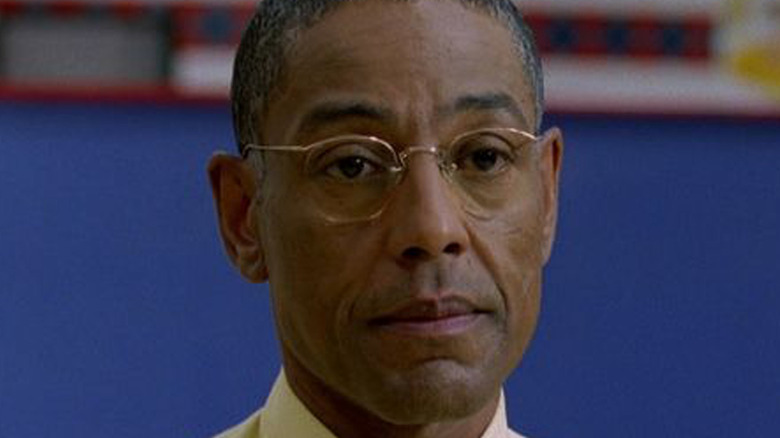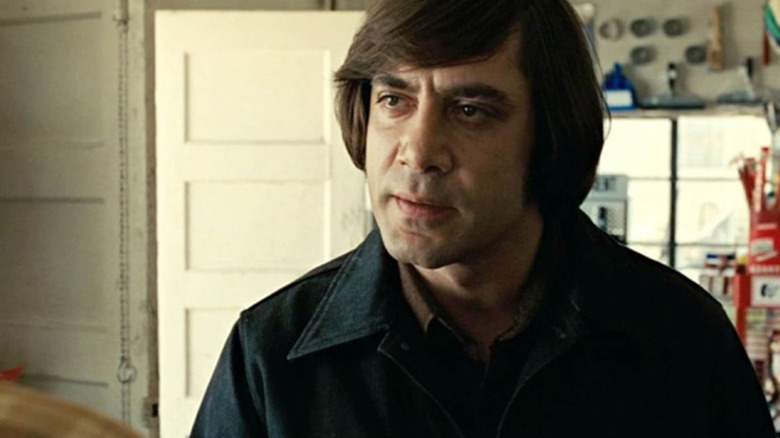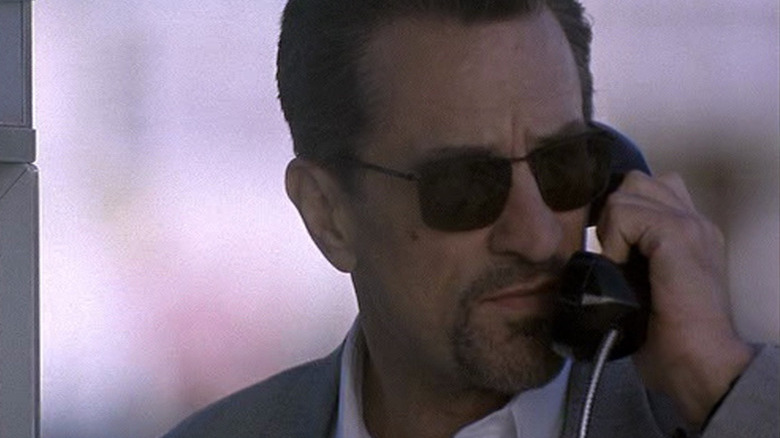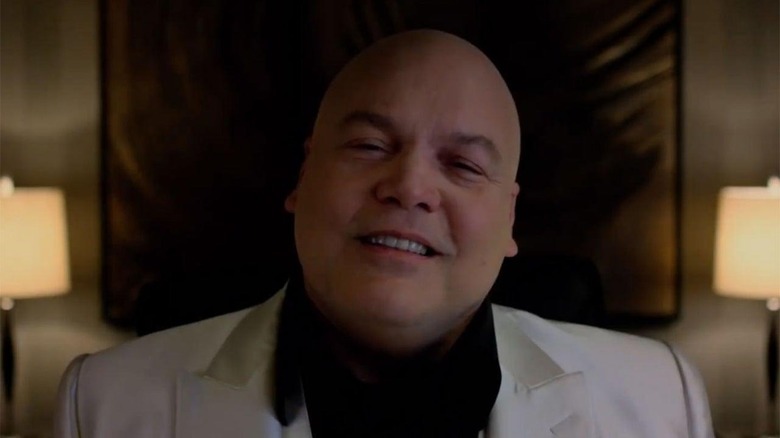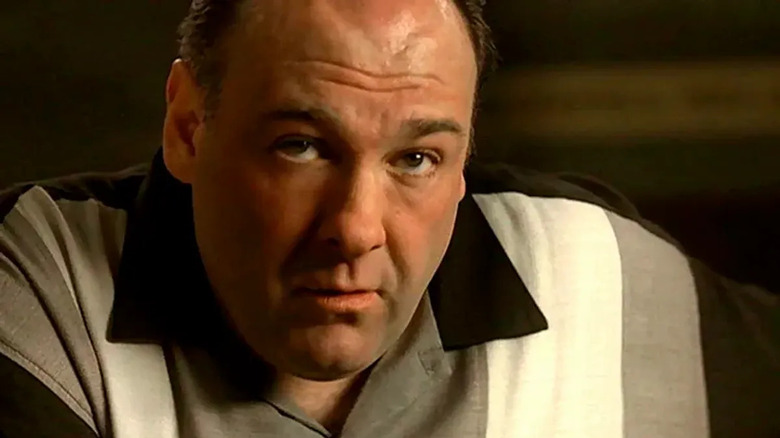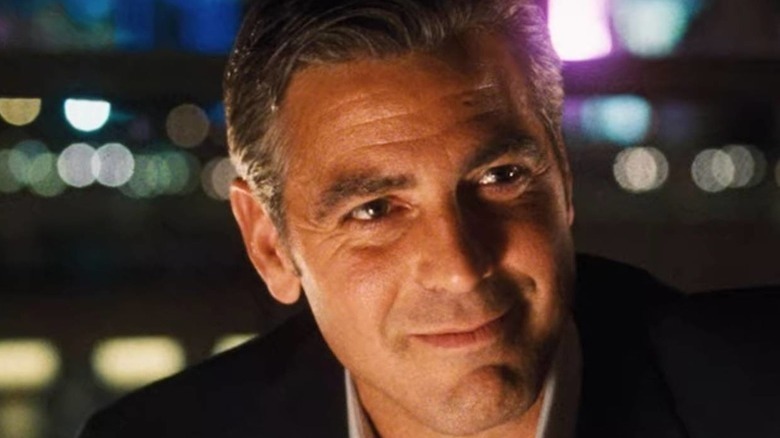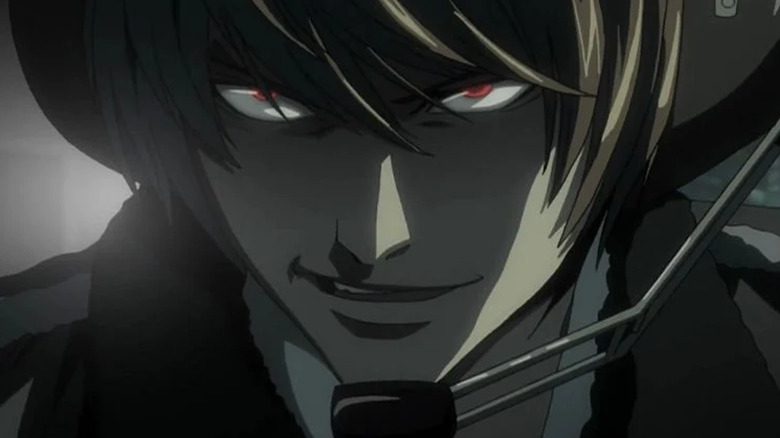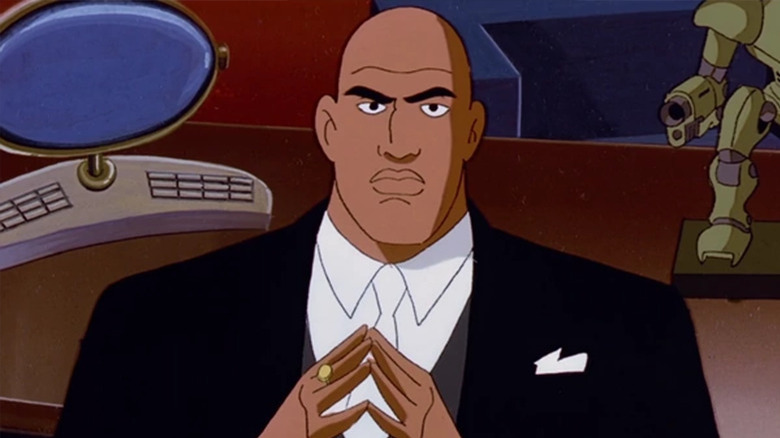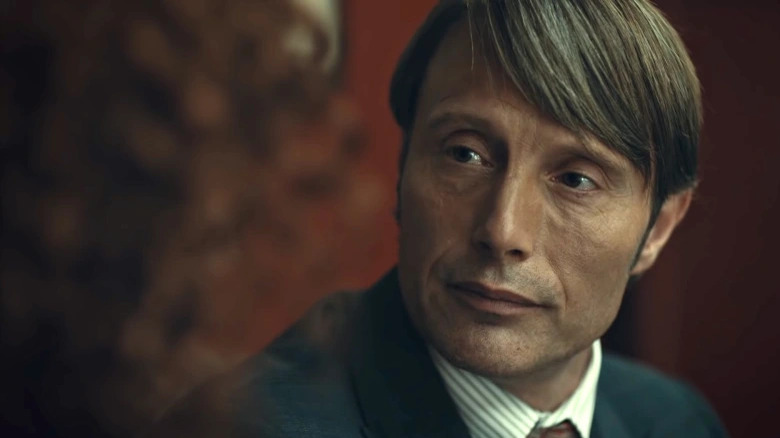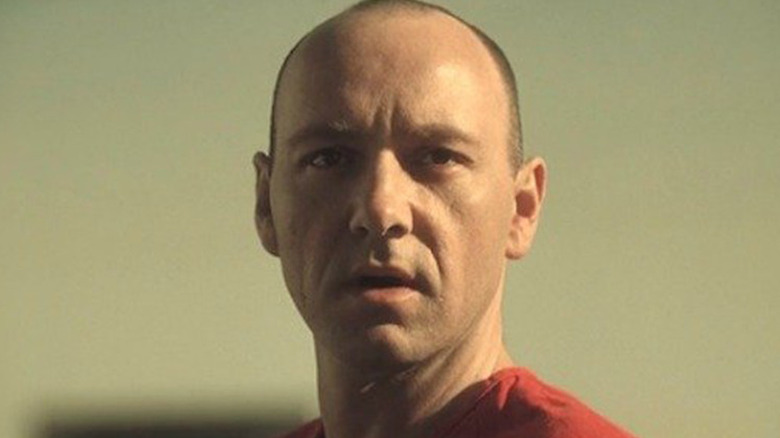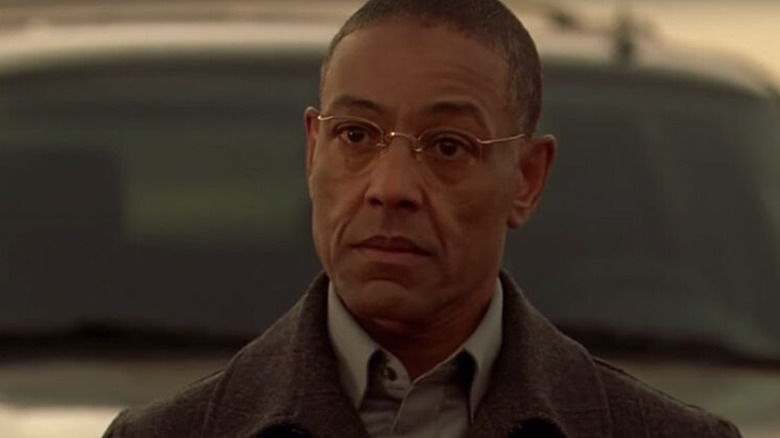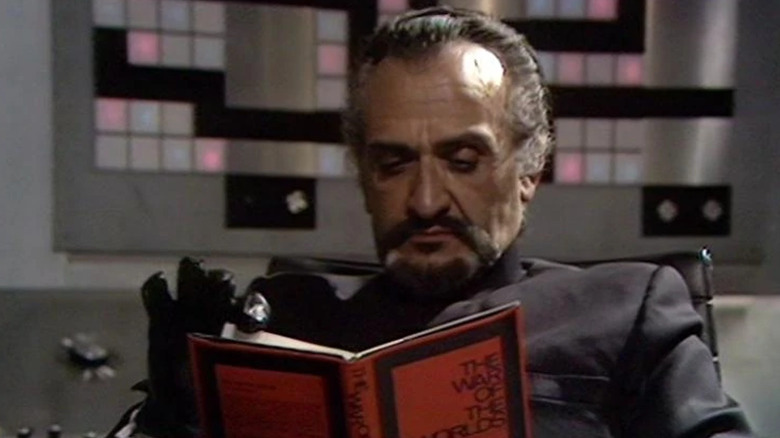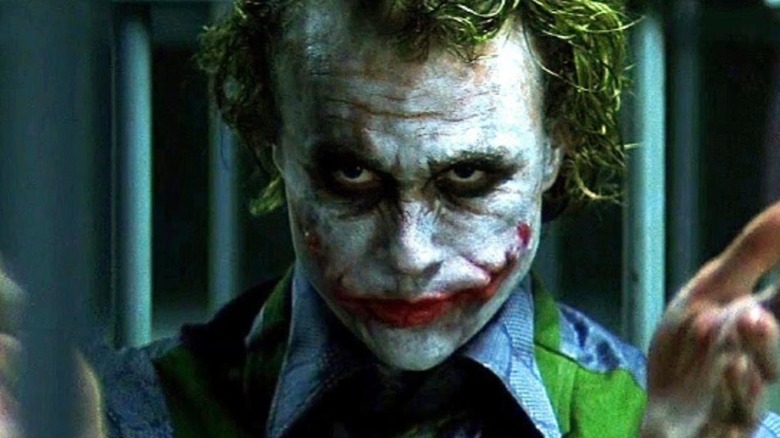The Smartest Criminals In Movie And TV History
Criminals: often horrendous human beings in real life but a welcome subject for many acclaimed films and television series. There's no denying that the average pop culture viewer has an affinity for the bad guy, especially in the last few decades. Shows like "Breaking Bad" and "The Sopranos" have won hearts and minds with their depictions of fascinating yet morally gray characters. Film has been no stranger to this either, as for years cinema has been home to many of pop culture's most intriguing criminal minds. Many of cinema's finest filmmakers, from Martin Scorcese to Quentin Tarantino to the Coen brothers, have played a hand in this still-ongoing trend.
We seem to be living in a golden era when — especially in terms of lasting popularity — it definitely pays to be the bad guy. And the more brains you have, the more you can stay ahead of everyone else intellectually, the bigger that payoff can be. These are just a few notable examples of some of the smartest criminals in film and television history.
Anton Chigurh
When you watch a Coen brothers movie you can never be too sure what you are going to get. Sometimes you'll get something played for comedy, sometimes something that's completely serious, or often something that mixes the two together. However — in the case of "No Country For Old Men" — we honestly can't think of another film more bereft of humor than this one. From the moment the film begins you are immediately filled with the sense that something bad is about to happen. This is cemented when we are introduced to Anton Chigurh (Javier Bardem), a hitman with a penchant for heads-or-tails coin flips.
When we first meet Anton we learn just how blunt, cold and disturbingly efficient he is, as he murders a cop and a civilian in sickening succession. From that point on, whenever Anton is on screen, the scene goes from zero to 100 really quickly in terms of anxiety. While we don't learn anything concrete about his origins, Anton's motivations are actually made fairly clear. Anton seems to view himself as a "hand of fate" — doing the terrible things that he does out of a twisted sense of moral obligation. From his first moments on screen to his last, Anton succeeds at being one of cinema's smartest and most terrifying criminals.
Neil McCauley
"Heat" still stands as one of the greatest crime films of all time, elevated by two incomparable performances from its two leads. The plot is loosely based on the real life hunt for criminal Neil McCauley, portrayed on screen by Robert De Niro. Following an intense robbery of an armored car which leaves several dead, McCauley quickly becomes a target of the LAPD. This lands him in the crosshairs of Lieutenant Vincent Hanna, played by Al Pacino, beginning an epic game of cat and mouse.
McCauley is best described as a criminal with a code, citing a necessity to avoid any unnecessary attachments one cannot easily abandon. This mixed with his tact for planning and coordination makes for a truly enthralling antagonist and foil for Vincent Hanna. The film is noteworthy for being the first time that De Niro and Pacino would be on screen with each other at the same time. The scene where the two have a vulnerable and somewhat casual chat over some coffee is a powerhouse — one of the crime genre's finest.
Wilson Fisk
The "Daredevil" television series, which originally premiered on Netflix in 2015, still stands as one of Marvel's most celebrated page-to-screen adaptations. One aspect of the show that fans rampantly praise to this day is its main villain — Wilson Fisk, aka the Kingpin.
The Kingpin has been a mainstay of the Marvel Comics universe ever since his creation in July 1967. The character has become such a major threat that he has served as an antagonist for Spider-Man, Daredevil and the Punisher. So when it was announced that none other than Vincent D'Onofrio would take on the role in "Daredevil," fans naturally got excited.
There's a fair amount of time before we see Fisk onscreen, but the fearful way people talk about him definitely sends the message. So when we first meet him, it's jarring to see him converse with Vanessa, a charming art dealer, in a kind and insecure way. His mean streak is then reaffirmed when we see him turn someone's head into pulp with a car door. It's this balance of menace and reserved scheming that makes him such a great foil for Matt Murdoch aka Daredevil (Charlie Cox). The character has recently been reintroduced into the Marvel Cinematic Universe via "Hawkeye" and fans are rabid for his next appearance.
Tony Soprano
The subject of various thinkpieces and dorm room posters, "The Sopranos" has left a sizable mark on pop culture history. From its nearly impeccable writing to its quotable dialogue, the show still remains a classic over two decades after it debuted. At the center of the show is Tony Soprano, played by the late, great James Gandolfini and one of television's most memorable characters. Throughout the show's run — from its debut in 1999 to its (controversial) finale in 2007 — Tony became an icon. The mob boss is intriguing in that he doesn't seem intellectually gifted upon first sight, with his intelligence coming more from accrued street smarts.
While not the most eloquent of speakers, Tony possesses a definite understanding of the ruthless world he conducts business in. Throughout the series Tony knows exactly what to say, what to do and who to call when things start going sideways. Much of this stems from his very rough and often abusive upbringing, which we learn a fair bit about throughout the show. From his father's criminal activities to his narcissistic mother, Tony was left with an ample amount of mental baggage to unpack. It's his hybrid of cunning intelligence, relatability and reprehensibility that earns Tony the distinction of being one of modern television's most memorable protagonists.
Danny Ocean
In terms of heist movies you can't get much more iconic than the "Ocean's" trilogy directed by Steven Soderbergh. In the first film, "Ocean's Eleven," Danny has recently gotten out of prison and looks to immediately get back to "work." This results in him assembling his crew for a heist job, which would become a staple of the "Ocean's" trilogy. Danny is a classic Hollywood criminal with all the standard traits — charming, handsome and ridiculously cool under pressure. It's a character who lives and dies by his inherent charm and intelligence — two things that George Clooney plays rather well.
The Danny Ocean archetype of the suave heist master has seen itself parodied in the likes of "Rick and Morty" and "The Simpsons." Clooney's portrayal, as well as the film, were so well received that it would garner two follow-ups and a spin-off film. Danny Ocean is a simple yet effective character for a simple yet very effective (and entertaining) series of movies.
Yagami Light
"Death Note" is a celebrated staple of the anime genre and a definite introductory title for many newcomers. The story follows Yagami Light, a Japanese high school student who has what most would consider a pretty good life. But despite his top marks in class and assured academic success, Light is bored out of his skull with his daily routine. Things all change when a Shinigami (Japanese Death God) named Ryuk drops his Death Note in the human world. The Death Note is quickly picked up by a curious Light who begins testing its disturbing ability to kill people.
It doesn't take too long for Light to go mad with power and declare himself worthy of being a god. His hot streak of killings doesn't go unnoticed for very long, soon gaining the attention of a detective known as L. With both on equal footing in terms of intelligence, it makes the battle between the two an epic chess match to be sure. There are certain points throughout the show where even the viewer isn't sure what Light's true end game is until it's too late. Yagami Light is the perfect hybrid of impressive intelligence and rampant psychosis, which makes for a truly memorable anime antagonist.
Lex Luthor
Lex Luthor is one of the DC Comics universe's most endearing and intriguing villains, having served as Superman's main antagonist for decades. His legacy has been built upon dozens of appearances across different variations of the DC canon, both live action and animated. After the runaway success of "Batman: The Animated Series," it was decided that Superman deserved a show of his own. "Superman: The Animated Series" would hit the airwaves in 1996, introducing a new generation of fans to the Man of Steel. Within the series many of Superman's classic foes would make appearances, such as the Toyman, Darkseid and — most notoriously -– Lex Luthor.
Here Lex is voiced by Clancy Brown, best known for playing Mr. Krabs on "SpongeBob Squarepants" and as the fearsome Kurgan in "Highlander." What makes this version of Lex Luthor great — along with his vast intelligence — is the fine line he walks between powerful public figure and evil genius. During his original appearances in "S:TAS" he's routinely able to hide his nefarious machinations from public view. We watch him grow from seeing Superman as a nuisance to seeing him as his greatest foe, even developing a severe inferiority complex. The character would go on to be a recurring villain in the follow up series, "Justice League," still voiced by Clancy Brown.
Hannibal Lecter
Hannibal Lecter is undoubtedly one of the horror genre's most fascinating monsters, having gone through many different portrayals and stylistic interpretations. The character has seen the likes of Brian Cox, Anthony Hopkins and Gaspard Ulliel portray him on screen in different movies. But in the 2010s, a new actor would step into the role and become, for many, the definitive version of Hannibal Lecter. That actor in question would be Mads Mikkelsen, best known at the time for portraying Le Chiffre in "Casino Royale."
"Hannibal" features a unique take on Lecter (Mads Mikkelsen) that's very different from his presentation in "The Silence of the Lambs." Throughout the series, Hannibal — despite carrying out several horrendous, often publicly displayed crimes — manages to evade capture. The show never once deviates from showcasing just how thorough, focused, and organized Hannibal is. It's even borderline aggravating when it shows just how close people are to figuring out Hannibal's true nature — often just barely missing the mark. Despite being a ruthless, often emotionally detached cannibal, Hannibal never once wavers in terms of his public and well-respected, sophisticated persona. From his introductory scene to his final moments, Hannibal never fails to maintain his often subdued yet menacing demeanor.
John Doe
Even 27 years later, "Seven" still remains one of the most disturbing noir thrillers ever put to film. David Fincher's direction, combined with the writing of Andrew Kevin Walker, still makes for an enthralling watch over a quarter century later. The film looks and makes the viewer feel absolutely disgusting, from the grimy cinematography to the unsettling subject matter. Two detectives, a veteran and a rookie, are hot on the heels of a malicious serial killer with a chilling gimmick. All of his murders appear to be patterned after the seven deadly sins of legend, leading to a frightening slew of reveals. Later in the film the killer chooses to do the unthinkable and give himself over to the police. However, this is soon revealed to be just another twist in his carefully plotted, and sickening, machinations.
What makes John Doe so terrifying is just how efficient he is in his plan, even down to the most minuscule detail. Even when all is said and done, with the film reaching its horrifically cathartic climax, we still never learn his real name. John Doe is an onscreen monster so cold, calculating and detached that it's difficult to believe he really could exist.
Gustavo Fring
"Breaking Bad" is still widely regarded as one of the best additions to the modern television landscape, helping to popularize the phrase "binge watching." This can be attributed to its enthralling plot, impeccable editing and stellar cast of characters. In the show's second year, Walter White's rise to infamy hit an intriguing road block in the form of Gustavo Fring. Gustavo evokes intense menace by being able to switch back and forth between his cheery public persona and his intense true nature. While on the surface Gustavo might appear to be a kind and philanthropic fried chicken restaurateur, his true profession is far more sinister. In truth he is a major player in the methamphetamine game who will take a life with very little second thought.
The character rarely, if ever, shows his violent side but when he does — most notably in the episode "Box Cutter" — it is jaw-dropping. His character would provide the perfect foil for Walter before he would usurp Gus' kingpin role for himself in the fifth season. "Better Call Saul," the spin-off series that follows the rise of Saul Goodman, also provides insight into Gustavo as well. Giancarlo Esposito has definitely maintained the same level of calm menace that had made the role so iconic in the first place.
The Master
If the Doctor is Sherlock Holmes, then the Master is most definitely his James Moriarty. Since "Doctor Who" has been on the air for nearly 60 years, many of its iconic villains have made repeat appearances. This includes not only the Daleks and the Cybermen, but the Master himself, who has gone through many different incarnations since his creation. First introduced during the run of the Third Doctor (Jon Pertwee), the Master was originally portrayed by Roger Delgado. The character was received so well by the fans that he was brought back for several subsequent serials. Following Delgado's unfortunate passing in 1973, the Master would, much like the Doctor, be retooled and regenerated countless times throughout the years.
Following Delgado, the likes of Anthony Ainley, Eric Roberts, Derek Jacobi, Jon Simm, Michelle Gomez and most recently Sacha Shawabn would take up the reins. Each actor would bring their own unique flair and presentation to the iconic role, leaving behind their own unique legacies. What never changes, however, is just how far each version of the Master will go to prove their superiority to the Doctor. Each also manages to somehow be smarter and more devious than the last, with some versions bringing Earth to the brink of annihilation.
The Joker
The Joker is often considered to be one of the greatest comic book villains of all time, and for very good reason. Regardless of how he's being interpreted — be it colorful and campy or serious and sinister — he's always portrayed as Batman's perfect opposite. Whereas Batman is a flawed but ultimately humane force for justice, the Joker is a sadistic sociopath with a severe violence streak. Nowhere is this exemplified more than in the second installment of Christopher Nolan's now legendary Batman trilogy, "The Dark Knight."
Heath Ledger portrays a version of the Joker that, up until 2008, had yet to be seen on the big screen — an iteration set entirely within the confines of a mostly grounded and realistic world. In this version, the Joker is portrayed as an intensely disturbed, anarchistic psychopath with a rampant disregard for human life. Despite his undeniable insanity and admission of not having a plan, it's clear that he has thought everything out from almost every angle. His endgame is so multi-tiered that even when he "loses" to Batman he still succeeds in his ultimate goal. The Joker isn't a person you can barter or reason with because, as Alfred says, "Some men just want to watch the world burn."
